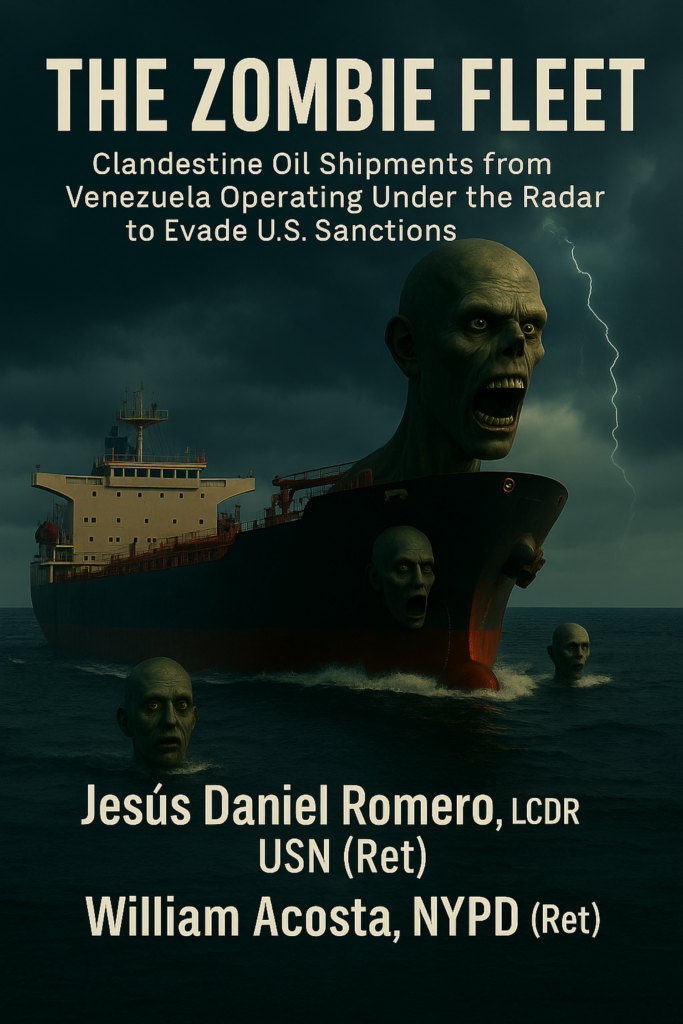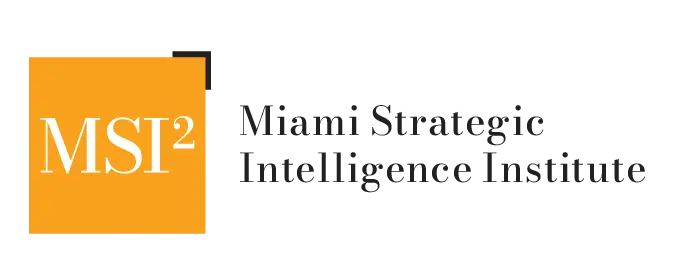04 May The Zombie Fleet: Undead Vessels, Illicit Crude, and Maduro’s Maritime Smuggling Empire
By,
Jesús Daniel Romero, Co-Founder and Senior Fellow, MSI² & William Acosta, SME
Summary
In a bold display of maritime deception, the Maduro regime has ramped up its use of so-called “zombie tankers” to export oil in violation of U.S. sanctions. These ghost ships—operating under stolen identities, falsified documentation, and manipulated satellite signals—have become central to Venezuela’s survival strategy. Once the United States tightened the screws on oil exports, the regime, led by Nicolás Maduro and financial fixer Alex Saab, expanded the same tactics to Venezuela’s gold reserves, building a dual-track evasion system that now spans multiple continents.
How Zombie Tankers Operate
Venezuela’s zombie fleet uses a combination of maritime fraud and technological trickery to stay ahead of international enforcement mechanisms:
- Stolen Ship Identities: Vessels adopt the names and IMO numbers of decommissioned tankers, entering global registries as legitimate ships. The tanker Varada, for instance, arrived in Malaysia in April 2025 using the identity of a ship scrapped in 2017—though it was in fact a sanctioned supertanker (Bloomberg News, 2025).
- AIS Manipulation: Ships disable their Automatic Identification Systems (AIS), disappearing from satellite tracking while transiting critical chokepoints (Nación Logística, 2025).
- Flag Hopping: Operators register vessels under flags of convenience, such as Comoros, which lack enforcement capacity or political will (Oil Channel, 2025).
- High-Seas Transfers: Crude is transferred between ships in international waters to obscure both its origin and its final destination (Bloomberg News, 2025).
- Spoofed Locations: Some tankers broadcast false AIS positions from as far away as the Gulf of Guinea, disguising their real trajectory (Bloomberg News, 2025).
Recent Cases: The Anatomy of Deception
Starboard Maritime Intelligence and Bloomberg have identified at least four zombie tankers leaving Venezuela’s José and Amuay terminals, hauling more than 7 million barrels of crude:
- The “Varada” / “M Sophia” Case: This 32-year-old VLCC reached Malaysia on April 18, 2025, using the identity of a ship scrapped years prior. It had conducted multiple ship-to-ship transfers and transmitted false location data throughout its voyage.
- Gema, Alana, and New Inspiration: These ships followed similar tactics. The Gema and Alana sailed fully loaded around the Cape of Good Hope, while the New Inspiration departed José terminal en route to South Africa. In every case, investigators found visual and structural discrepancies with the identities the ships claimed to represent (La República, 2025).

Strategic Impact and Growing Risks
- Sanctions Evasion: Venezuela continues to generate oil revenue —now funneled largely to China— despite international restrictions (Infobae, 2025).
- Environmental Hazards: These ghost ships operate uninsured and outside regulatory systems, posing major risks of spills and maritime disasters.
- International Blind Spots: As detection tactics lag behind, enforcement agencies, insurers, and allied governments struggle to keep pace with the evolving threat.
- Economic Consequences: While the regime profits, Venezuelans suffer from systemic poverty, blackouts, and mass migration, seeing no benefit from this shadow economy.
The U.S. Response: From Sanctions to Seizures
The United States has responded forcefully—but selectively—against the expanding zombie fleet network. Alongside economic sanctions and tariffs, Washington has recently begun criminal enforcement actions with direct U.S. nexus:
- Direct Sanctions: In January 2025, the U.S. sanctioned the M Sophia, a VLCC linked to Russian and Venezuelan networks.
- Tariffs: In March 2025, President Donald Trump announced a 25% tariff on oil purchases from Venezuela, even if routed through intermediaries in China or Macau (CNN Español, 2025).
President Trump has strongly and emphatically warned that any nation, corporation, or shipping entity that continues to violate oil-related sanctions against Venezuela “will face severe and crippling consequences.” His administration has framed this enforcement not only as a matter of law, but as a matter of national security and global deterrence.
- Enforcement Breakthrough: On November 4, 2024, the U.S. Department of Justice announced the arrest of Taskin Torlak, a Turkish national who allegedly coordinated a complex oil smuggling scheme involving Venezuelan and Iranian tankers. According to DOJ, Torlak oversaw vessel renaming, reflagging, AIS manipulation, and deceptive payments through U.S. financial institutions—marking the first known case of direct enforcement inside the United States.
“Torlak and his co-conspirators explicitly discussed the need to hide their conduct from the U.S. Government… using deception to smuggle black market oil for the benefit of PDVSA.”
— U.S. DOJ Press Release, Nov 4, 2024
This followed the largest U.S. seizure of Iranian fuel to date—over 1.1 million barrels bound for Venezuela in 2020.
- Global Coordination: The U.S. has encouraged joint action among regulatory bodies, insurers, and maritime watchdogs.
- Diplomatic Pressure: Nations such as China and Malaysia are being pushed to strengthen port inspections and import controls.
From Crude to Gold: The Saab Blueprint
Alex Saab and the Maduro regime invested extraordinary effort into building networks that could bypass U.S. sanctions. Once oil exports became heavily restricted, they turned to Venezuela’s gold reserves.
This secondary evasion architecture relied on a barter economy—gold exchanged for gasoline, food, and industrial inputs—with Turkey and Iran as key partners:
- Extraction from the Orinoco Mining Arc
- Export to Turkey and Barter Deals via CLAP
- Deals with Iran for Gasoline and Equipment
- Money Laundering via Shell Companies
Even after Saab’s arrest, the logistical framework he helped establish has endured. Though he was extradited to the United States and formally charged, Saab was later pardoned by the Biden administration in a controversial prisoner swap. His release raised questions about the long-term commitment to dismantling the full scope of Venezuela’s sanctions-evasion apparatus.
Meanwhile, Vice President Delcy Rodríguez has assumed an increasingly visible international role, with recently documented trips to China, Russia, and Iran. These visits suggest she may now serve as the regime’s public-facing figure in global negotiations and economic coordination. However, Alex Saab remains the true architect of the sanctions evasion network—one that blends illicit maritime trade, gold-for-goods diplomacy, and financial laundering across continents.
Conclusion: A 21st Century Smuggling Empire
Venezuela’s zombie tanker strategy is not a desperate workaround—it is a methodical, transnational operation supported by financial ingenuity and geopolitical partnerships. Through stolen identities, maritime signal spoofing, and gold-for-goods exchanges, the regime has rewritten the playbook on sanctions evasion.
The global community must now confront a high-stakes question: Can international enforcement adapt quickly enough to dismantle this system before it becomes a model for rogue states worldwide?
As Bloomberg concluded:
“Venezuela’s zombie fleet has opened a new chapter in 21st-century hydrocarbon smuggling.”
References
ACAMS Today. (2022, June 16). El producto del crimen: La historia de Alex Saab. ACAMS. https://www.acamstoday.org/el-producto-del-crimen-la-historia-de-alex-saab/
Armando.info. (2023, April 9). El caso de Alex Saab. https://armando.info/series/el-caso-de-alex-saab/
BBC News. (2019, February 2). Turkey warned over Venezuela gold trade. https://www.bbc.com/news/world-europe-47092784
Bloomberg News. (2025, April 29). Buques zombi de Venezuela: Así burlan sanciones de EE.UU. rumbo a Asia y China. https://www.bloomberg.com/news/articles/2025-04-29/buques-zombi-de-venezuela-asi-burlan-sanciones-de-ee-uu-rumbo-a-asia-y-china
Blu Radio. (2025, April 30). PDVSA estaría usando buques “zombies” para mover petróleo, según informe [Video]. YouTube. https://www.youtube.com/watch?v=NdKsLnX5YcU
CNN Español. (2025, March 24). Trump dice que cualquier país que compre petróleo a Venezuela se enfrentará a aranceles del 25%. https://cnnespanol.cnn.com/2025/03/24/eeuu/aranceles-paises-petroleo-venezuela-trax/
Díaz Reus. (2021, January 13). Maduro se apoya en Irán tras salida de Rosneft de Venezuela, y paga con oro. https://diazreus.com/maduro-se-apoya-en-iran-tras-salida-de-rosneft-de-venezuela-y-paga-con-oro/
Foundation for Defense of Democracies (FDD). (2019, July 26). Treasury’s Venezuela sanctions target the tip of the Turkish iceberg. https://www.fdd.org/analysis/2019/07/26/treasurys-venezuela-sanctions-target-the-tip-of-the-turkish-iceberg/
Infobae. (2025, April 29). “Buques zombis”: La nueva táctica para burlar las sanciones y transportar petróleo venezolano. https://www.infobae.com/venezuela/2025/04/29/buques-zombis-la-nueva-tactica-para-burlar-las-sanciones-y-transportar-petroleo-venezolano/
La República. (2025, April 29). Los barcos zombi se vuelven rápidamente parte del comercio de petróleo venezolano. https://www.larepublica.co/globoeconomia/los-barcos-zombi-se-vuelven-rapidamente-parte-del-comercio-de-petrolero-venezolano-4122087
N Digital. (2025, January 10). Irán y Venezuela: Una alianza estratégica de cooperación militar y económica. https://n.com.do/2025/01/10/iran-y-venezuela-una-alianza-estrategica-de-cooperacion-militar-y-economica/
Nación Logística. (2025, April 29). Buques zombis: La nueva táctica para burlar sanciones y mantener a flote el comercio. https://nacionlogistica.com/buques-zombis-la-nueva-tactica-para-burlar-sanciones-y-mantener-a-flote-el-comercio/
Oil Channel. (2025, April 29). Buques zombis resurgen en el comercio de crudo venezolano, alertan expertos. https://oilchannel.tv/noticias/buques-zombis-resurgen-en-el-comercio-de-crudo-venezolano-alertan-expertos
United States Department of Justice. (2024, November 4). Turkish national arrested for allegedly conspiring to violate Venezuela-related sanctions. https://www.justice.gov/opa/pr/turkish-national-arrested-allegedly-conspiring-violate-venezuela-related-sanctions
United States Department of Justice. (2020, August 14). Largest U.S. seizure of Iranian fuel from four tankers. https://www.justice.gov/opa/pr/largest-us-seizure-iranian-fuel-four-tankers
